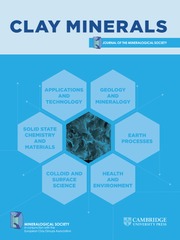Crossref Citations
This article has been cited by the following publications. This list is generated based on data provided by
Crossref.
Novembre, D.
di Sabatino, B.
Gimeno, D.
and
Pace, C.
2011.
Synthesis and characterization of Na-X, Na-A and Na-P zeolites and hydroxysodalite from metakaolinite.
Clay Minerals,
Vol. 46,
Issue. 3,
p.
339.
Hildebrando, E. A.
Angélica, R. S.
Neves, R. F.
and
Valenzuela-Diaz, F. R.
2012.
Síntese de zeólita do tipo faujasita a partir de um rejeito de caulim.
Cerâmica,
Vol. 58,
Issue. 348,
p.
453.
Hildebrando, Edemarino A.
Angélica, Rômulo S.
de Freitas Neves, Roberto
and
Valenzuela-Díaz, Francisco Rolando
2012.
Synthesis of Zeolitic Materials Using as a Source of SiO<sub>2 </sub>and Al<sub>2</sub>O<sub>3</sub> Calcined Kaolin Waste.
Materials Science Forum,
Vol. 727-728,
Issue. ,
p.
1349.
Alves, J. A. B. L. R.
Dantas, E. R. S.
Pergher, S. B. C.
Melo, D. M. A.
and
Melo, M. A. F.
2013.
Synthesis of high value-added zeolitic materials using glass powder residue as a silica source.
Materials Research,
Vol. 17,
Issue. 1,
p.
213.
Santos, S. C. A. dos
Rocha Junior, C. A. F.
Silva, L. N. da
Angélica, R. S.
and
Neves, R. F.
2013.
Caulins amazônicos: possíveis materiais de referência.
Cerâmica,
Vol. 59,
Issue. 351,
p.
431.
Maia, Ana Áurea Barreto
Angélica, Rômulo Simões
de Freitas Neves, Roberto
Pöllmann, Herbert
Straub, Chris
and
Saalwächter, Kay
2014.
Use of 29Si and 27Al MAS NMR to study thermal activation of kaolinites from Brazilian Amazon kaolin wastes.
Applied Clay Science,
Vol. 87,
Issue. ,
p.
189.
Hildebrando, Edemarino Araujo
Andrade, Christiano Gianesi Bastos
Rocha Junior, Carlos Augusto Ferreira da
Angélica, Rômulo Simões
Valenzuela-Diaz, Francisco Rolando
and
Neves, Roberto de Freitas
2014.
Synthesis and characterization of zeolite NaP using kaolin waste as a source of silicon and aluminum.
Materials Research,
Vol. 17,
Issue. suppl 1,
p.
174.
Maia, Ana Áurea B.
Neves, Roberto F.
Angélica, Rômulo S.
and
Pöllmann, Herbert
2015.
Synthesis of sodalite from Brazilian kaolin wastes.
Clay Minerals,
Vol. 50,
Issue. 5,
p.
663.
Silva Filho, S. H. da
Bieseki, L.
Silva, A. R. da
Maia, A. A. B.
San Gil, R. A. S.
and
Pergher, S. B. C.
2015.
Synthesis of Zeolite A employing Amazon kaolin waste.
Cerâmica,
Vol. 61,
Issue. 360,
p.
409.
Maia, Ana Áurea B.
Neves, Roberto F.
Angélica, Rômulo S.
and
Pöllmann, Herbert
2015.
Synthesis, optimisation and characterisation of the zeolite NaA using kaolin waste from the Amazon Region. Production of Zeolites KA, MgA and CaA.
Applied Clay Science,
Vol. 108,
Issue. ,
p.
55.
Bernal, Susan A
Rodríguez, Erich D
Kirchheim, Ana Paula
and
Provis, John L
2016.
Management and valorisation of wastes through use in producing alkali‐activated cement materials.
Journal of Chemical Technology & Biotechnology,
Vol. 91,
Issue. 9,
p.
2365.
Longhi, Márlon A.
Rodríguez, Erich D.
Bernal, Susan A.
Provis, John L.
and
Kirchheim, Ana Paula
2016.
Valorisation of a kaolin mining waste for the production of geopolymers.
Journal of Cleaner Production,
Vol. 115,
Issue. ,
p.
265.
Silva Filho, Severino Higino da
Bieseki, Lindiane
Maia, Ana Aurea B.
Treichel, Helen
Angelica, Rômulo Simões
and
Pergher, Sibele Berenice Castellã
2017.
Study on the NaOH/metakaolin Ratio and Crystallization Time for Zeolite a Synthesis from Kaolin Using Statistical Design.
Materials Research,
Vol. 20,
Issue. 3,
p.
761.
da Silva, Liliane Nogueira
Moraes, Dorsan dos Santos
Santos, Suzianny Cristina Arimatéa
and
Corrêa, José Augusto Martins
2018.
Joint synthesis of Zeolite A-LDH from mineral industry waste.
Applied Clay Science,
Vol. 161,
Issue. ,
p.
163.
Maia, Ana Áurea B.
Dias, Rafael N.
Angélica, Rômulo S.
and
Neves, Roberto F.
2019.
Influence of an aging step on the synthesis of zeolite NaA from Brazilian Amazon kaolin waste.
Journal of Materials Research and Technology,
Vol. 8,
Issue. 3,
p.
2924.
Kumar, Amit
and
Naskar, Milan K.
2019.
Single‐step process without organic template for the formation of zeolite A from RHA.
International Journal of Applied Ceramic Technology,
Vol. 16,
Issue. 4,
p.
1525.
Castro, Paulo Renan dos Santos de
Maia, Ana Áurea Barreto
and
Angélica, Rômulo Simões
2019.
Study of the Thermal Stability of Faujasite Zeolite Synthesized from Kaolin Waste from the Amazon.
Materials Research,
Vol. 22,
Issue. 5,
Arianpour, Aslı Çakır
and
Arianpour, Farzin
2022.
Characterization, technological properties, and ceramic applications of Kastamonu alluvial clays (Northern Turkey) in building materials.
Construction and Building Materials,
Vol. 356,
Issue. ,
p.
129304.
Longhi, Márlon A.
Rodríguez, Erich D.
Zhang, Zuhua
Torres, Sandro M.
Barata, Márcio S.
and
Kirchheim, Ana P.
2022.
Kaolin mining waste to produce geopolymers: Physicomechanical properties and susceptibility to efflorescence formation.
Case Studies in Construction Materials,
Vol. 16,
Issue. ,
p.
e00846.
Ejtemaei, Mahboobeh
Sadighi, Sepehr
Rashidzadeh, Mehdi
Khorram, Sirous
Back, Jan O.
Penner, Simon
Noisternig, Michael F.
Salari, Dariush
and
Niaei, Aligholi
2022.
Investigating the Cold Plasma Surface Modification of Kaolin- and Attapulgite-Bound Zeolite A.
Journal of Industrial and Engineering Chemistry,
Vol. 106,
Issue. ,
p.
113.


